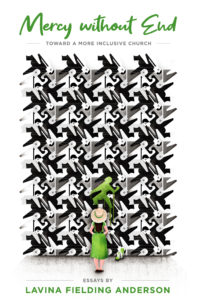 Author: Lavina Fielding Anderson
Author: Lavina Fielding Anderson
Title: Mercy Without End: Towards a More Inclusive Church
Signature Books, 2020. Essays.
Reviewed by Christopher Angulo
Mercy Without End is filled with pain, anger, and suffering. Lavina’s words cut deep, and for a moment you feel the pain of exclusion that she and countless others have felt. The wound festers with each turn of the page as you read of the betrayal and hurt caused by people that were expected to provide love and confidence. However Lavina does not leave the wound untended; she sees it and fills it with faith, hope and love.
Lavina Fielding Anderson is an important scholar of Mormon studies, and a life-long believing Church member, but was excommunicated for publishing stories of ecclesiastical abuse in 1993. She has continued to attend her local ward throughout the years after her excommunication. Her book contains eighteen essays (15 of which are published for the first time), which span thirty-three years (1985-2018). In almost every essay you get a glimpse into the author’s excommunication experience, thoughts on spiritual abuse, and stories of exclusion and suppression. Her thoughts and writings on these topics are strong and painful. Yet, Lavina does not let them control the narrative of the book, or her life.
Lavina is able to find light where there is only darkness; to see mansions in a land filled with doghouses. In Sacrament Meeting, Whittier Ward, Salt Lake City, 1993, she provides a deep-dive into what she later calls her “ritual” of excommunication. In one of her darkest moments, where she was cut off from the church that she loved and served, Lavina found peace and understanding. Describing an event that occurred a few months after her excommunication, where her son served the sacrament to the stake president that excommunicated her, Lavina penned “We are all together within dedicated walls, all beloved children of God, all mortal human beings, imperfect and broken. For all of us, Christ suffered and died to bring healing and wholeness. Something hallows this moment. I feel at peace.”
Last night before bed, my wife asked me why I liked the book so much. My response was simple; it ignited a fire in me. While reading I felt a need to be more compassionate, more reaching, more loving. I constructed plans on how to be better in my ecclesiastical positions, my family duties, and my human responsibilities. I learned that being loud, while necessary at times, is far less effective than listening and sharing. The book is filled with mercy from cover to cover, and I thank Lavina for having the courage and fortitude to live what she writes.
Christopher Angulo is from “Los” Vegas. Lost in the worlds of Mormonism and book collecting. Earned a J.D. from UNLV. Still trying to skate every day until I die.

.
I’m so happy to learn Lavina’s written a book. Her wisdom, we need it.